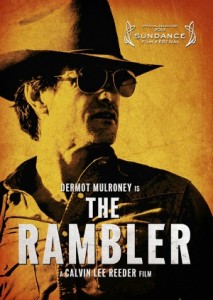
Director: Calvin Reeder
MPAA Rating: R
Film Pulse Score: 7/10
Incongruous or unnatural. Abstract. Macabre. Mundane. These are terms often used to describe films that seem to assault the viewer’s senses with sights and sounds that at first don’t make any sense whatsoever. In the end, even upon final analysis they may still not make any sense. In the film community you may often hear them phrased as surreal, cubist or Lynchian. These are often challenging films that truly depend on the audience’s willingness to become active participants in the experience. It goes beyond just sitting there and seeing the imagery or hearing the sounds but to truly attempt to process it all on the fly. Basically try to keep up is a simple way to put it. In the right hands you may find yourself drawn into the mystery and willing to tolerate whatever is thrown at you. In the wrong hands you’ll no doubt lose patience and want to run out screaming “What the hell was that?”
In the last decade or so, films like Tree of Life, Black Swan, Beyond the Black Rainbow, Moon or Inland Empire have been received so divisively that anyone could make a solid argument that any of these films could be classified as good or bad. In 2011 director Calvin Lee Reeder’s film The Oregonian received the same reception with a clear divide between those who loved it and those who didn’t; this viewer was in the former. Now, in 2013, he returns with his latest feature film The Rambler. Based on a short Reeder made in 2008, the feature film version follows a recently released convict’s travels as he makes his way through the vast wilderness of the open road on his way to his brother’s ranch. En route he encounters various interesting and peculiar folk and often finds himself in some intriguing situations.
This is a very different film from his last or even any of his shorts for that matter. It plays like an existential comedy. One man coming to grips with his life in a humorous round-a-bout kind of way. The film starts out as a road trip comedy but ever so slowly starts to scratch away at the surface to reveal that there’s something more at play here. The Oregonian was a lot to process but The Rambler is not as wrapped up in an enigma which may make it somewhat more accessible for some audiences. This is why The Oregonian may be a better film than The Rambler but this is just one viewer’s opinion. Larger in scope and budget, this film looks much more polished, cleaner and features some fine scope cinematography by Dave McFarland. Reeder continues his signature use of audio to underscore or illicit a response during a scene. However it is a bit more restrained in comparison to The Oregonian. There are some bloody and gruesome moments, as well as the darkest of humor, it wouldn’t be a Reeder film without them, that will come off as shocking, funny or weird. For a low budget film the special effects were pretty solid. The full body make up effects were quite good.. As for the direction and screenplay, it remained engaging and never felt confusing or convoluted. There is quite a bit to process here and not many viewers will come to the same conclusions. Much like The Oregonian or even Lynch’s Mulholland Drive, it’s open to interpretation and not one can be consider the wrong or right one.
Dermot Mulroney stars as the title character and he embodies his role with some of the liveliest deadpan that it’s often funny. Lindsey Pulsipher appears as The Girl, the woman the Rambler simply can’t get out his head. Pulsipher is always game for whatever he asks her to do. She is not put through the ringer as she was in The Oregonian but does receive her fair share of abuse. The rest of the cast, which includes Natasha Lyonne, portray some interesting characters that help breath life into this peculiar universe.
Reeder’s latest film is most certainly surreal. However it is often quite cubist and in many instances obviously so. Lynchian? Well if you want to over generalize it. You will certainly recognize moments that are “Lynchian” but you may also recognize other moments that seem Jodorowsky-esque, Raimi-ish, Nolan-esque or even Aranofsky-like. Lynch isn’t the only director out there who makes surreal, cubist, nonsensical films nor was he the first (think Fritz Lang or Robert Wiene.) When it comes to doing things surreal, cubist or Lynchian, Reeder isn’t the first nor will he be the last but is the latest amongst a group of directors who are pushing the envelope of traditional storytelling. He’s in good company. Now get rambling.






